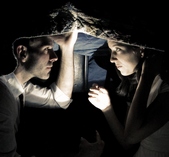SITE GUIDE
SEARCH
REVIEWS
REVIEW ARCHIVES
ADVERTISING AT CURTAINUP
FEATURES
NEWS
Etcetera and
Short Term Listings
LISTINGS
Broadway
Off-Broadway
NYC Restaurants
BOOKS and CDs
OTHER PLACES
Berkshires
London
California
New Jersey
DC
Philadelphia
Elsewhere
QUOTES
TKTS
PLAYWRIGHTS' ALBUMS
LETTERS TO EDITOR
FILM
LINKS
MISCELLANEOUS
Free Updates
Masthead
A CurtainUp Review
The Sister
| "I am so
thankful to you, Leanne, for letting me be your sister and for
putting up with the fact that I exist. And I also thank Bob, from
whom all good things come, to whose eternal beneficence I owe my
whole existence. Where would I be if it wasn’t for you
two?"— Colleen
|

Levi Morger & Erin Mallon.
(Photo by Simone Eymann)
|
Things change when Colleen runs off with their eccentric neighbor, Terry (Levi Morger), as Bob and Colleen work to renovate the home’s living room. But while the characters in Eric John Meyer’s confusing new play go through some drastic transformations in the course of just over an hour, they remain as half-baked as that unfinished room. That’s because The Sister is composed around themes more than characters, symbols more than reality.
This is a play about power and love — specifically, the pain we inflict on others to maintain the artifices of our own broken relationships. And while the characters never feel quite real, their suffering does. It is so tangible, in fact, it’s almost impossible to enjoy the play as it’s billed as a “jet black comedy.” With that lightness missing from its core, what remains is an unflinchingly dark portrait of human nature. Theatergoers looking for a reward at the end of that tunnel might find themselves grasping at air.
When Colleen suddenly leaves, the fabric of Bob and Leanne’s fragile relationship unravels. Bob’s testosterone-fueled rage, once directed at Colleen, changes targets. Leanne now assumes the role of the subjugated (even donning the dog collar once reserved for Colleen). She and Bob both, eventually, revert to an animal existence as they drive each other crazy. As Leanne crawls on her hands and knees and barks like a dog or cowers in fear of her tyrannical husband, our impulse is not, as intended, to laugh, but rather to squirm in our seats.
Kreager plays the family’s volatile patriarch with disarming flexibility, one moment presenting a false sense of husbandly goodness and the next showing us his true dictatorial colors. This range is on full display when Bob and Leanne discover Colleen’s disappearance. Bob immediately calms Leanne’s nerves, wrapping her in a tight embrace. But when Leanne wants to dance, Bob won’t loosen his grip, quickly turning the situation into an explosive confrontation. Kreager pulls it off commendably.
Now living with Terry, Colleen flourishes in the brilliance of what might be her first experience of kindness. Most of the laughs are here, in the pair’s hackneyed expressions of love (“I think your eyes are like these two big reflectors on the back of a boat, and all I can see are those two reflectors telling me how to follow you home,” Terry pines). They are strange bedfellows indeed, and Mallon and Morger admirably make the most of this small comedic window.
It seems that Colleen has moved on. But that façade crumbles when Colleen asks Terry to work The Machine. “Somehow I feel it would ease my pain to know that someone was out there doing something like that,” she says. “It would make me feel less like my life was a waste.” Terry refuses, and Colleen returns to Bob and Leanne’s home, begging to return to her old life.
The Sister is played too straight to shake away the seriousness of Bob’s cruelty. As the characters onstage degrade and humiliate each other, dread and discomfort settles in a thick, toxic smog hanging over the theater.
Realism, it seems, is not Meyer’s priority. But while that propensity for experimentation had a dramatic payoff in his 2010 one-man monologue, Not Winehouse, there’s no such retribution here. As the story winds down, we hope for a moment to make sense of the destruction. It doesn’t come. Instead the action comes to a crashing halt in the play’s baffling conclusion. It’s just the last of many strange lurches in this ill-constructed machine.
| The Sister by Eric John Meyer Directed by Jess Chayes Cast: Jeb Kreager (Bob), Erin Mallon (Colleen), Levi Morger (Terry), Alley Scott (Leanne) Set Design: Sara C. Walsh Costume Design: Deanna R. Frieman Lighting Design: Derek Wright Sound Design: Asa Wember Associate Sound Design: Kyle Moore Stage Manager: Sarah Schoofs Running Time: 70 minutes New York Theatre Workshop's 4th Street Theater, 83 East 4th Street, nytw.org, 212-780-9037 Through 4/13/13 Performance times: Wednesday - Saturday at 7:30pm with an added show Sunday, March 24 at 7:30pm Ticket cost: $18 Reviewed by Jordan G. Teicher at March 27 performance. |
| REVIEW FEEDBACK Highlight one of the responses below and click "copy" or"CTRL+C"
Paste the highlighted text into the subject line (CTRL+ V): Feel free to add detailed comments in the body of the email. . .also the names and emails of any friends to whom you'd like us to forward a copy of this review. Visit Curtainup's Blog Annex For a feed to reviews and features as they are posted add http://curtainupnewlinks.blogspot.com to your reader Curtainup at Facebook . . . Curtainup at Twitter Subscribe to our FREE email updates: E-mail: esommer@curtainup.comesommer@curtainup.com put SUBSCRIBE CURTAINUP EMAIL UPDATE in the subject line and your full name and email address in the body of the message. If you can spare a minute, tell us how you came to CurtainUp and from what part of the country. |

Slings & Arrows- view 1st episode free
 Anything Goes Cast Recording
Anything Goes Cast RecordingOur review of the show
 Book of Mormon -CD
Book of Mormon -CDOur review of the show

